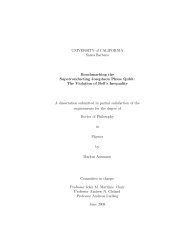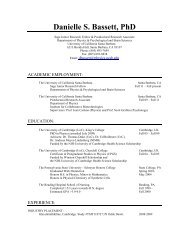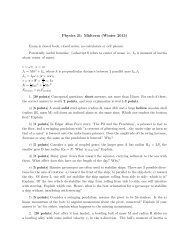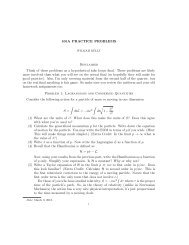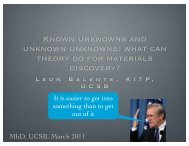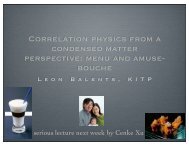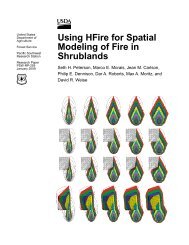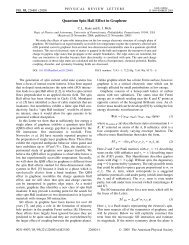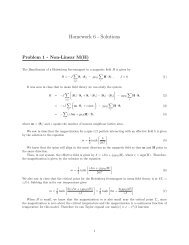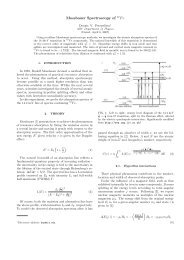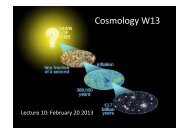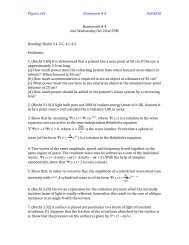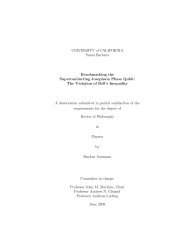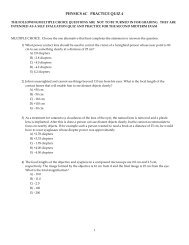Notes on Relativity and Cosmology - Physics Department, UCSB
Notes on Relativity and Cosmology - Physics Department, UCSB
Notes on Relativity and Cosmology - Physics Department, UCSB
Create successful ePaper yourself
Turn your PDF publications into a flip-book with our unique Google optimized e-Paper software.
2.2. THE ELUSIVE ETHER 49<br />
particular reference frame with respect to which this speed should be measured:<br />
the reference frame of the water itself. Moreover, experiments with moving<br />
water did in fact show that 1/ √ ǫµ gave the speed of light through water <strong>on</strong>ly<br />
when the water was at rest 6 . The same thing, by the way, happens with regular<br />
surface waves <strong>on</strong> water (e.g., ocean waves, ripples <strong>on</strong> a p<strong>on</strong>d, etc.). There is<br />
a wave equati<strong>on</strong> not unlike (2.5) which c<strong>on</strong>trols the speed of the waves with<br />
respect to the water.<br />
So, clearly, c should be just the speed of light ‘as measured in the reference<br />
frame of the vacuum.’ Note that there is some tensi<strong>on</strong> here with the idea we<br />
discussed before that all inertial frames are fundamentally equivalent. If this<br />
is so, <strong>on</strong>e would not expect empty space itself to pick out <strong>on</strong>e as special. To<br />
rec<strong>on</strong>cile this in their minds, physicists decided that ‘empty space’ should not<br />
really be completely empty. After all, if it were completely empty, how could it<br />
support electromagnetic waves? So, they imagined that all of space was filled<br />
with a fluid-like substance called the “Luminiferous Ether.” Furthermore, they<br />
supposed that electromagnetic waves were nothing other than wiggles of this<br />
fluid itself.<br />
So, the thing to do was to next was to go out <strong>and</strong> look for the ether. In<br />
particular, they wanted to determine what was the ether’s frame of reference.<br />
Was the earth moving through the ether? Was there an ‘ether wind’ blowing<br />
by the earth or by the sun? Did the earth or sun drag some of the ether with<br />
it as it moved through space?<br />
The experiment that really got people’s attenti<strong>on</strong> was d<strong>on</strong>e by Albert Michels<strong>on</strong><br />
<strong>and</strong> Edward Morley in 1887. They were motivated by issues about the nature of<br />
light <strong>and</strong> the velocity of light, but especially by a particular phenomen<strong>on</strong> called<br />
the “aberrati<strong>on</strong>” of light. This was an important discovery in itself, so let us<br />
take a moment to underst<strong>and</strong> it.<br />
2.2.1 The Aberrati<strong>on</strong> of Light<br />
Here is the idea: C<strong>on</strong>sider a star very far from the earth. Suppose we look at<br />
this star through a telescope. Suppose that the star is “straight ahead” but<br />
the earth is moving sideways. Then, we will not in fact see the star as straight<br />
ahead. Note that, because of the finite speed of light, if we point a l<strong>on</strong>g thin<br />
telescope straight at the star, the light will not make it all the way down the<br />
telescope but will instead hit the side because of the moti<strong>on</strong> of the earth. A bit<br />
of light entering the telescope <strong>and</strong> moving straight down, will be smacked into<br />
by the rapidly approaching right wall of the telescope, even if it entered <strong>on</strong> the<br />
far left side of the opening (see diagram below). The effect is the same as if<br />
the telescope was at rest <strong>and</strong> the light had been coming in at a slight angle so<br />
that the light moved a bit to the right. The <strong>on</strong>ly light that actually makes it<br />
to the bottom is light that is moving at an angle so that it runs away from the<br />
<strong>on</strong>coming right wall as it moves down the telescope tube.<br />
6 However, physicists like Fizeau did find some odd things when they performed these<br />
experiments. We will talk about them shortly.



